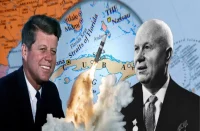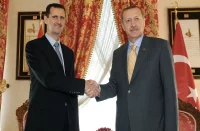Jeyran Bayramova (Azerbaijan)
Will the United States go against Turkey’s wishes and recognize the Armenian genocide? That remains to be seen.
“United States Blackmails Turkey over Recognition of the Armenian Genocide.” That is the headline that was splashed on the pages of leading Turkish newspapers prior to the NATO summit in Lisbon at which the Americans planned to discuss deployment of missile defense system components in Turkey. Deployment of the missile defense system in return for not recognizing the genocide— that is the object of Washington’s blackmail if we are to believe Hurriyet Daily News. There is also talk about another condition—improved relations between Turkey and Israel which, as we know, are not at their best. Washington is very serious according to the Turkish newspaper, and Ankara will make a decision on these issues very soon.
But is the United States as intimidating as it thinks it is? Apparently not, otherwise Ankara would not have resisted Washington by immediately saying it sees no threat from Iran and Syria, against which the United States wants to direct its missile defense system. Actually, this situation is a logical extension of what has been happening for at least the past eight years. It was eight years ago when a team of reformers led by Erdoğan came to power that American-Turkish relations began taking a different route, with Turkey gradually freeing itself of US influence. Whereas at first Washington carefully watched the “democratization experiment” of its military and political ally as led by the moderate Islamist Erdoğan, after a few years during which Ankara enjoyed some success in the pursuing a foreign policy course independent of the United States and set its own priorities for the future, the White House began seriously thinking about what to do and how to “rein in” its rebellious brother!
March 4, 2010. That was the day the US House of Representatives Foreign Relations Committee approved a resolution recognizing the Armenian genocide. The Committee adopted the resolution with a single dissenting vote, thus paving the way for the possible recognition of the genocide in Congress should Turkey not “mend its ways.” However, the United States is unlikely to allow that to happen. The blackmail most likely is intended to appeal to popular opinion. The Americans are well aware that recognition of the genocide will further complicate American-Turkish relations and, more importantly, have unpredictable consequences for the entire region, including the South Caucasus with its frozen conflicts.
But why is the genocide issue on the US agenda this year?! It would be naïve to suppose the reason is American sympathy for the aspirations of the Armenian people. Or has Obama, in contrast to his predecessors, decided to fulfill the promise he made to Armenian American voters during his election campaign? Hardly. Washington ignored the issue for many years because there was no need to antagonize its strategic ally Turkey, for which recognition of the genocide is a very sensitive topic. With the blood of Indians on their hands the Americans are reluctant to talk about genocide, realizing they could be accused of the same thing. So what happened?
It obviously has to do with Erdoğan’s Turkey, which clearly is unhappy with the US-Israel pairing. Present-day Turkey is certainly not the country of the generals who danced to the West’s tune. Upon taking office, Erdoğan initially concentrated on domestic political issues. Like an experienced gardener, he plowed and loosened up the soil so that it would be ready to receive the seeds of political reform at the proper time. Washington did not attach a great deal of importance to that, thinking that Kemal’s Turkey in which the military held sway would never submit to reform by ambitious leaders. Previous attempts were made to reform Turkey, but everybody knows how they turned out.
Suffice it to mention the Turkish leader Adnan Menderes, an outstanding reformer who attempted to weaken the military’s influence but paid a dear price for it. The Turkish generals staged a military coup, replaced the president with their own man—Cemal Gürsel—and quickly executed Menderes. Turkey’s economy had began flourishing under Menderes, and the country began acting independently in the foreign policy arena, but… with consideration given to the interests of the United States, which saw Turkey as its advisor in the region but not as an independent player; so that could not go on for long.
Many observers thought that something similar might happen to Erdoğan’s political team, but without an execution this time, of course. However, as Erdoğan’s popularity rose and he gained sympathy and support from neighboring countries, it became increasingly difficult for Washington to “let him off the leash.” On the other hand, some people thought the silence and passivity of the United States meant Erdoğan’s Turkey is an American project aimed at realizing the American dream—bringing Iran to its knees.
On closer examination, the project boiled down to consolidating Islamic forces around Islamist Turkey’s increasing popularity and then weakening the ring of support around Iran, which for many years now has aspired to become the leader of the Islamic world. If there was such a project, it looks like Erdoğan is simply taking a chance on “suckering” the Americans. If Turkey earns dividends from consolidating the Islamic states they will go to Erdoğan for having transformed Turkey into a regional state, while Washington will have to be satisfied with being the cat whose mouse was stolen from under its nose.
Ankara’s policy today is being implemented under the barcode of “zero problems with neighboring countries,” as indicated by the settlement of problems in its relations with Russia, Pakistan, Syria and Iran, as well as by Turkey’s stepped-up efforts to settle the Middle East conflict and the promotion of Islamic values in its domestic and foreign policy activities—all of which gives the United States more cause for concern. In addition, amidst the rapid deterioration of Turkish-Israeli relations, which have always been special both because of the military-political cooperation and the virtually identical role that both countries play for the United States, the growing joint engagement between Moscow and Ankara is the last straw for Washington.
We get the impression that neither the confrontation with Israeli President Shimon Peres at Davos nor the sharp reaction to the Freedom Flotilla incident was an accident. Whereas Erdoğan’s first event attempt to paint himself as a defender of all Muslims was intended more for domestic consumption and thus was an effective PR stunt in the run-up to elections in Turkey, the second incident was an attempt to secure his place as a leader in the Islamic world. It is hardly a secret that for Israel Turkey has always been a base from which to split the solid Muslim front regarding Palestinian autonomy, which had a negative impact on Turkey’s image with pro-Iran states.
In short, Erdoğan as a brilliant populist initially pursued self-serving goals, both from the standpoint of preserving personal power in the country and in designing Turkey’s new national interests. The tripartite initiative by Ankara, Brazil and Tehran on uranium enrichment that was announced this year is deserving of separate treatment. Even though it failed it illustrated the Turkish government’s desire to “needle” Washington.
From that it is clear why US officials have begun openly hinting that Ankara’s policy on Iran, the strain in its relations with Israel and its position on nuclear defense will essentially define the future course of Turkish-American relations. They are trying to get through to the Turks that if Ankara does not make positive efforts in those directions, Turkey will only have itself to blame and should not be surprised if the resolution to recognize the Armenian genocide passes by the end of the year.
Under the circumstances, Ankara will certainly not look for trouble and will attempt to mollify the United States in the usual manner of Eastern diplomacy. However, it is unlikely to obediently carry out Washington’s mandates because it understands that recognition of the genocide would create a headache for both Turkey and the White House. For example, it is possible, although unlikely, that should the Armenian genocide resolution pass, Ankara could take much bolder action—it could withdraw from NATO and even join CSTO, an anti-NATO military coalition. For now, of course, CSTO membership is like something out of a fairy tale. Nevertheless, it could be put into play as an attention getter.
Much more realistic would be an American attempt to placate the Turks by raising the Kurdish issue, but there is a big “however” there, too. Having learned a lesson from Iraq, the Americans are unlikely to step in the same hole twice. In addition, the idea of autonomy for the Turkish Kurds in Turkey did not immediately meet with US approval, and now it is not even mentioned. Just imagine a wave of autonomy tomorrow flooding both Iraq, where there are Kurds, and neighboring territories. So in this case the interests of Ankara and Washington coincide, and there is nothing to complain about—unless the issue of human rights violations in areas of Turkey inhabited by the Kurds could be raised, but that is an old tune. At one time State Department reports on human rights regularly pointed to violations of the rights of Kurds in Turkey by noting pressure on Kurdish NGOs, etc.
In the mid-1990s, the U.S. Congress imposed temporary restrictions on arms sales to Turkey when American weapons were used in dispossessing citizens in Turkish Kurdistan. But in the context of Erdoğan’s current policy advocating the expansion of Kurdish rights, which has encountered harsh criticism from Turkey’s military elite, an accusation that Ankara is violating Kurds’ human rights would be an obvious exploitation of the issue to put pressure on Ankara. So will the Americans sink to that level? Obviously not. Another question is what else are they prepared to surprise Turkey with should it continue pursuing an independent policy…?
Jeyran Bayramova is an Azerbaijani journalist.
Source: New Eastern Outlook














Comments